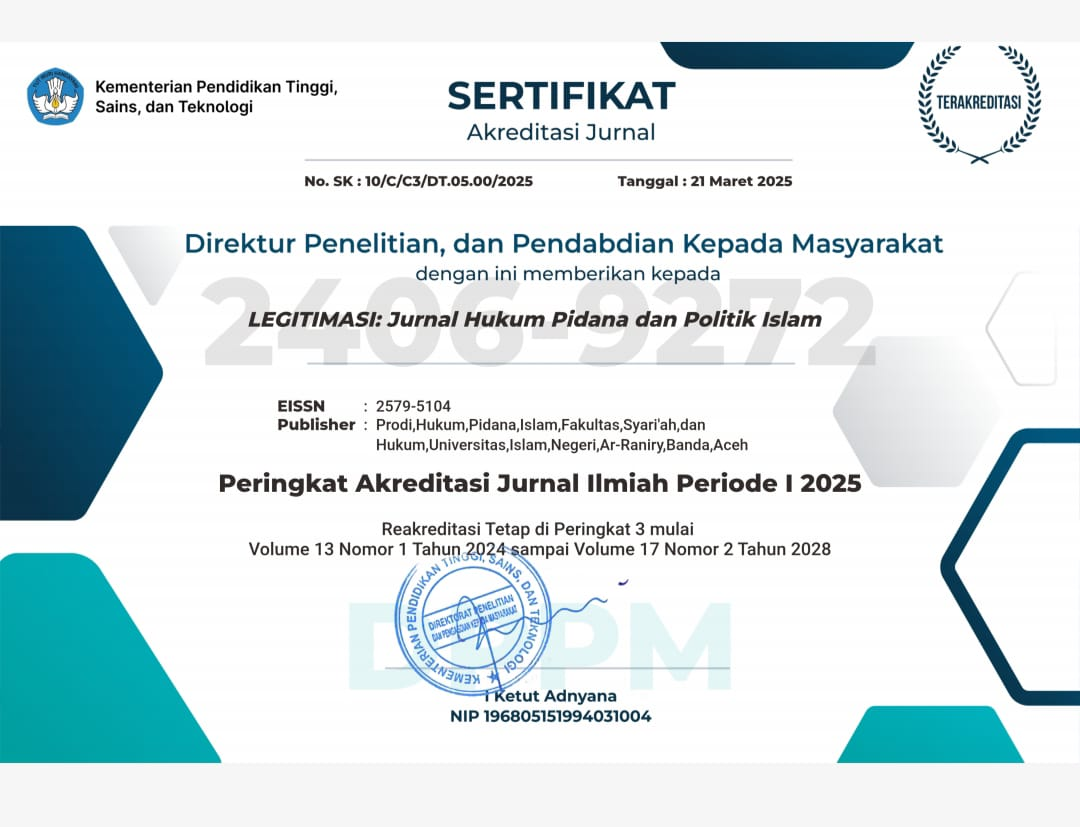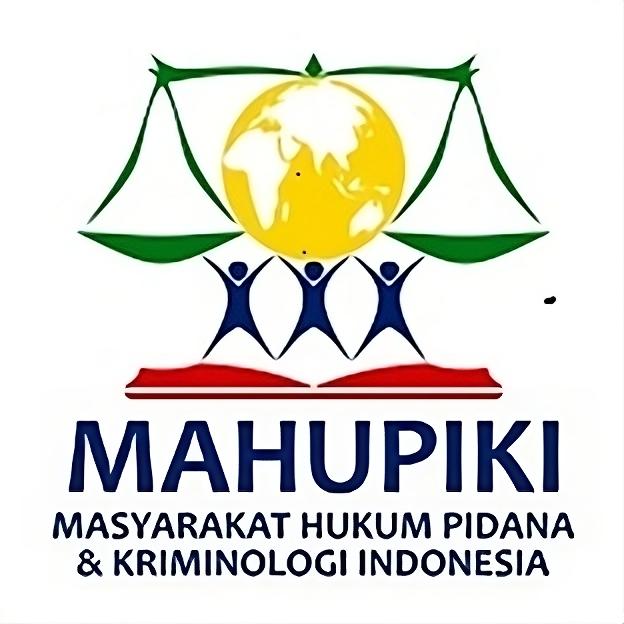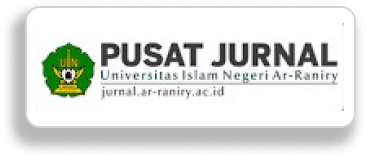Resolving Illegal Fishing in Rumpon Unjam: The Strategic Role of Panglima Laot in Aceh's Customary Law
DOI:
https://doi.org/10.22373/legitimasi.v13i2.23286Keywords:
Illegal Fishing, Crime, Role, Panglima Laot, Customary LawAbstract
Illegal fishing is a crime that causes one party to suffer losses. Consequently, fishing activities in Indonesian waters must adhere to the regulations. The purpose of creating a legal regulation is to establish a provision and legal protection in order to maintain peace within an organisation in the event of a conflict. In this instance, the existence of panglima laot in carrying out the function of customary law is one of the role models for the order of community life in resolving the issue of unauthorized fishing on Rumpon Unjam or other people's platforms. This research seeks to determine how the mechanism for resolving illegal fishing in Rumpun Unjam is governed by customary law with the function of panglima laot, as well as the review of Islamic law on the mechanism for resolving illegal fishing in Rumpon Unjam under customary law with the function of panglima laot. This research uses field research as its methodology. Among the methods of data collection are observation and interviews. The findings of this study indicate that the mechanism for resolving illegal fishing crimes in Rumpon Unjam, which are resolved by customary law by the Sea commander, is appropriate because the customary law imposed on the perpetrator requires a deterrent effect so that he or she will not repeat the same act by receiving appropriate sanctions for the sake of justice for the victim. According to a review of Islamic law, the mechanism for resolving illegal fishing crimes in Rumpun Unjam people who are resolved by custom by the commander of the laot is in accordance with the punishment recommended by the Qur'an because it uses ta'zir law, which is a punishment decision from the regional ruler, and the punishment imposed is appropriate retribution for the actions committed. When viewed from the victim's perspective, the imposed punishment is consistent with Islamic law because it satisfies the victim's sense of justice.
References
‘Awdah, ‘Abd al-Qadīr. Al-Tasyri‘ Al-Jina’Iy Al-Islamiy: Muqaranah Bi Al-Qanun Al-Wadh‘Iy. I. Bayrūt: Muassasah al-Risālah, 1997.
Abu Zahrah, Muhammad. Al-Jarimah Wa Al-’Uqubah Fi Al-Fiqh Al-Islami. Edited by Muhammad Rafiki. V. Vol. V. Kairo: Maktabah Tawfiqiyah, 2014.
Al-Muqaddisī, Ibnu Qudāmah. Al-Kāfī Fī Fiqh Imam Ahmad. I. Beirut: Dar Al-Kutub Al Ilmiyah, 1994.
Ali Yafie. Merintis Fiqh Lingkungan Hidup. Jakarta: Ufuk Press, 2006.
Az-Zuhaili, Wahbah. Fiqih Islam Wa Adillatuhu. III. Jakarta: Gema Insani, 2011.
Chapsos, Ioannis, and Steve Hamilton. “Illegal Fishing and Fisheries Crime as a Transnational Organized Crime in Indonesia.” Trends in Organized Crime 22, no. 3 (2019).
“Conservation Criminology.” In Criminology, 2021.
Diantha, I Made Pasek, and M S Sh. Metodologi Penelitian Hukum Normatif Dalam Justifikasi Teori Hukum. Prenada Media, 2016.
Edwards, Scott. “Fragmentation, Complexity and Cooperation: Understanding Southeast Asia’s Maritime Security Governance.” Contemporary Southeast Asia 44, no. 1 (2022).
Hasjmy, Ali. Kebudayaan Aceh Dalam Sejarah. Jakarta: Penerbit Benua, 1983.
Hefni, Mohammad. “Matrilokal Dan Kekuasaan Patriarkat.” 2Karsa, 2012.
Hurgronje, Christiaan Snouck. Aceh: Adat Istiadatnya. Jakarta Indonesia: Indonesian Netherlands for Islamic Studies, 1996.
Ismail, Badruzzaman. Ensiklopedia Budaya Adat Aceh. Banda Aceh: Majelis Adat Aceh, 2018.
Kasim, Fajri M, and Abidin Nurdin. “Study of Sociological Law on Conflict Resolution Through Adat in Aceh Community According to Islamic Law.” Samarah: Jurnal Hukum Keluarga Dan Hukum Islam 4, no. 2 (2020). https://jurnal.ar-raniry.ac.id/index.php/samarah/article/view/8231.
Kusuma, Bambang Ali, Lego Karjoko, Abdul Kadir Jaelani, I. Gusti Ayu Ketut Rachmi Handayani, and Muhammad Jihadul Hayat. “Establishment of Indonesian Maritime Power: Regulation of Transnational Organized Crime on Illegal, Unreported, and Unregulated (IIU) Fishing.” International Journal of Criminal Justice Sciences 16, no. 2 (2021).
Latif, Muhaemin, Darmawati Hanafi, Rahmi Damis, and Abdi Goncing. “Environmental Theology and Its Relevance to Islamic Law: Perception of Makassar Muslim Scholars, Indonesia.” Samarah 7, no. 3 (2023).
Law, Arab. “Methodological Issues in Islamic Jurisprudence Author ( s ): Mohammad Hashim Kamali Published by : Brill Stable URL : Https://Www.Jstor.Org/Stable/3381731” 11, no. 1 (2019): 3–33.
Lewerissa, Yanti Amelia. “Impersonating Fishermen: Illegal Fishing and the Entry of Illegal Immigrants as Transnational Crime.” Journal of Indonesian Legal Studies 3, no. 2 (2018).
Mohd Din. Stimulating the Development of National Criminal Law from Aceh for Indonesia. Bandung: Unpad Press, 2019.
Mufid, Mufid. “Mediasi Dalam Hukum Adat.” Al-Manhaj: Journal of Indonesian Islamic Family Law 2, no. 2 (2020): 128. https://doi.org/10.19105/al-manhaj.v2i2.3490.
Muhammad, Rusjdi Ali, and Dedy Sumardi. Kearifan Tradisional Lokal: Penyerapan Syariat Islam Dalam Hukum Adat Aceh. Banda Aceh: Dinas Syariat Islam Aceh, 2011.
Mujiburrahaman, and Rachmad Munazir. “Strategi Adat Panglima Laot Dalam Menyelesaikan Konflik (Sengketa) Masyarakat Nelayan Di Kabupaten Pidie Provinsi Aceh.” Jurnal Humaniora 2, no. 2 (2018): 113.
Puspita, Maya. “Kearifan Lokal Dalam Pengelolaan Sumber Daya Pesisir Laut: Hukum Adat Laot Dan Lembaga Di Nanggroe Aceh Darussalam.” Kajian Kebudayaan 3, no. 2 (2017).
Putra Jaya, Nyoman Serikat. “Hukum (Sanksi) Pidana Adat Dalam Pembaharuan Hukum Pidana Nasional.” Masalah-Masalah Hukum 45, no. 2 (2016): 123.
Sabiq, Al-Sayyid. Fiqh Al-Sunnah. III. Kairo: Dar al-Fath li I‘lam al-‘Arabi, 1996.
Soekanto, Soerjono. Masalah Kedudukan Dan Peranan Hukum Adat. Jakarta: Academica, 1979.
Soepomo. Chapters on Customary Law. Jakarta: Prandya Paramita, 1996.
Sumardi, Dedy, Mukhsin Nyak Umar, Ruslan Sangaji, Firdaus M Yunus, and Rahmatul Akbar. “Transition of Civil Law to Public Law: Integration of Modern Punishment Theory in Criminal Apostasy.” Ahkam: Jurnal Ilmu Syariah 22, no. 1 (June 30, 2022).
Trisna, Nila, Basri Basri, and Phoenna Ath Thariq. “The Existence of Panglima Laot and Its Function as the Form of Local Wisdom: A Case Study of Meureubo District in Aceh Province, Indonesia.” International Journal of Advances in Social Sciences and Humanities 1, no. 2 (2022).
Widyastono, Herry. “Metode Penelitian Ilmiah Dan Alamiah.” Jurnal Pendidikan Dan Kebudayaan, 2007.
Yuliantiningsih, Aryuni, Hartiwiningsih, Ade Maman Suherman, and Emmy Latifah. “From Illegal, Unreported and Unregulated Fishing to Transnational Organised Crime in Fishery from an Indonesian Perspective.” In ASEAN International Law, 2021.
Interview:
Interview with Syamsuddin, Public Figur, Meuke, 0n July 13, 2023, South Aceh
Interview with Head of Village, Meukek, on July 3, 2023, South Aceh
Interview with Amri, Panglima Laot Meukek, on July 26, 2023, South Aceh
interview with Abdul Karim, Fisherman, Meukek, on July 17, 2023, South Aceh
Interview with Head of Village, Keude Meukek, on July 3, 2023, South Aceh
Interview with Ahmad Bardan, Religious Leaders, Meukek, on July 25, 2023, South Aceh
Interview with Lukman Hakim, Public Figure, Keudee Meukek, on July 5, 2023, South Aceh
Downloads
Published
Issue
Section
License
Authors who publish in Legitimasi: Jurnal Hukum Pidana dan Politik Hukum agree to the following terms:
- Authors retain copyright and grant the journal right of first publication with the work simultaneously licensed Attribution-ShareAlike 4.0 International (CC BY-SA 4.0) that allows others to share the work with an acknowledgment of the work's authorship and initial publication in this journal.
- Authors are able to enter into separate, additional contractual arrangements for the non-exclusive distribution of the journal's published version of the work (e.g., post it to an institutional repository or publish it in a book), with an acknowledgment of its initial publication in this journal.
- Authors are permitted and encouraged to post their work online (e.g., in institutional repositories or on their website) prior to and during the submission process, as it can lead to productive exchanges, as well as earlier and greater citation of published work. (See The Effect of Open Acces)












